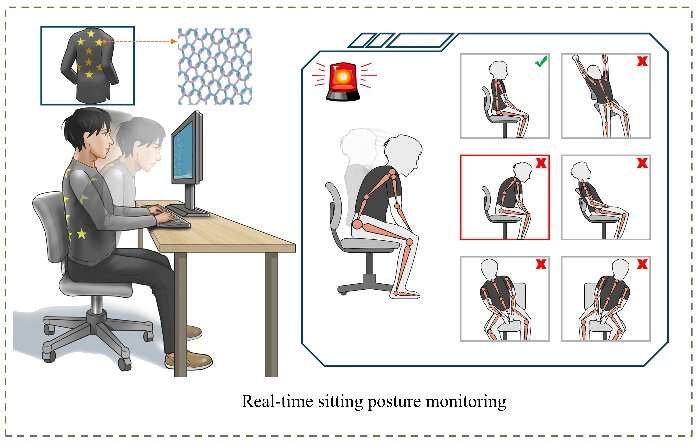
Posture is an important part of health. Prolonged poor posture, such as slouching or leaning to one side, can lead to pain and discomfort. It has also been shown to increase the risk of cardiovascular disease, vision problems, strokes, and musculoskeletal diseases. Solutions are needed to help people adjust their posture to prevent these problems and improve the health of students and people with sedentary careers. Current monitoring solutions have limitations that have prevented their widespread adoption. To solve this problem, researchers have developed a comfortable and durable self-powered fabric that can be paired with sensors to help correct posture in real time.
The self-powered fabric was developed using triboelectric nanogenerators (TENGs), which use movement to collect the energy needed to power the posture monitoring sensors. The data collected by the sensors is processed by an integrated machine learning algorithm that can provide immediate feedback, alerting the wearer when they need to adjust their posture.
The technology was described in a paper published on May 24 in Nano Research.
“People often sit in various poor postures in their daily life, leading to pain and discomfort,” said paper author Kai Dong, an associate researcher at the Beijing Institute of Nanoenergy and Nanosystems at the Chinese Academy of Sciences. “This ‘sitting disease’ could be alleviated if individuals were able to observe their real-time sitting posture by wearing a specific type of clothing made with smart textiles. With the self-powered sitting position monitoring vest we developed, users can watch their posture change on their screen and make necessary adjustments.”
The special fabric is created by knitting together a nylon fiber with a conductive fiber. As the wearer of the fabric moves, the fibers are stretched and compressed. The continuous movement and contact between the two fibers produce electricity, a phenomenon known as contact electrification.
The fabric stretches easily, is durable, washable and breathable, and it can be worn comfortably for long periods of time. This makes it ideal for long-term posture monitoring. According to paper author Zhong Lin Wang, the Hightower Chair of the School of Materials Science and Engineering and the Regents’ Professor at the Georgia Institute of Technology in the United States, factors like durability and comfort are important for how people use smart textiles.
“The flexibility, stretchability and bending ability all impact the comfort of the wearable sensors,” Wang said. “But these factors also affect how well the fabric works. The fabric exhibits good stretchability due to its knitting structure, which also increases its output and produces a higher voltage.”
In addition to the comfort of the fabric, another important aspect is the reliability of the posture monitoring. The sensors are stitched directly into the fabric in positions along the cervical spine, thoracic spine, and lumbar spine. These positions help collect data on the most common slouching positions, like humpback posture. The data that is collected by the sensors is then interpreted by a machine learning algorithm, which processes information about how the wearer is sitting, classifies their sitting position, and monitors how they correct their posture when prompted. This system is able to accurately recognize the wearer’s posture 96.6% of the time.
With this combination of wearability and precision, researchers hope this self-powered monitoring vest will help students and people with sedentary jobs avoid pain, discomfort, and long-term health problems. “We believe the TENG-based self-powered monitoring vest offers a reliable healthcare solution for long-term, non-invasive monitoring,” said Dong. “This also widens the application of triboelectric-based wearable electronics.”
Tech experts create wearable material that can generate electricity by capturing energy from body movements
Yang Jiang et al, Knitted self-powered sensing textiles for machine learning-assisted sitting posture monitoring and correction, Nano Research (2022). DOI: 10.1007/s12274-022-4409-0
Provided by
Tsinghua University Press
Citation:
Self-powered fabric can help correct posture in real time with the help of machine learning (2022, May 25)
retrieved 25 May 2022
from https://techxplore.com/news/2022-05-self-powered-fabric-posture-real-machine.html
This document is subject to copyright. Apart from any fair dealing for the purpose of private study or research, no
part may be reproduced without the written permission. The content is provided for information purposes only.
For all the latest Technology News Click Here
For the latest news and updates, follow us on Google News.

